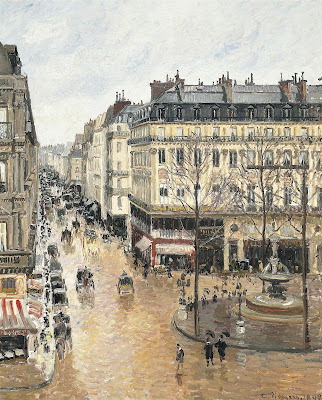On Tuesday, the U.S. Supreme Court heard oral argument in both the Boston flag First Amendment scrap (on this blog) and the latest transnational Nazi-appropriated-art case.
My take of the transcript accords with what I'm reading from commentators (e.g., Brian Dowling (subscription required)): It looks bad for Boston. The city seems to know that, having already pledged to rewrite its flag policy. So I'm not sure why this dispute has been belabored into a literal Supreme Court case.
Justice Kagan seemed unsure, too. She, and not she alone, regarded city commissioner George Rooney's refusal to raise the Christian ecumenical flag on a public pole as based on a mistaken understanding of the Establishment Clause, if "an understandable mistake."
Neutrality in the policy for "guest" flags rides to the rescue, abating any establishment-of-religion issue. So I don't expect this case will generate establishment or free exercise jurisprudence, nor any new First Amendment principle at all. The Court seemed willing to locate the case firmly in existing public forum doctrine. Boston just did a lousy job of defining the forum, creating for itself the "risk of being forced to fly the swastika," in the words of city counsel.
At least the case might yield a neat demonstration-of-principle opinion for law school casebooks.
The same day, the Court heard argument in the latest art appropriation (and expropriation) case. In the "Woman in Gold" vein, heirs of a Jewish family are trying to recover a Camille Pissarro painting, Rue St Honoré, Apres-midi, Effet de Pluie (1897) (pictured), that came into the possession of respondent Museo Nacional Thyssen-Bornemisza in Madrid.In its present iteration, the case involves a choice-of-law problem. Because the Spanish museum is a public entity, the Foreign Sovereign Immunities Act is implicated; claimants are threading the immunity needle through the FSIA "expropriation" exception. Ownership subsequently hinges on the substantive law of California or Spain. The district court used federal common law to choose Spanish law and reach a conclusion in favor of the museum. The claimants assert that California choice-of-law rules should pertain—though it remains arguable that California choice-of-law rules would render a different outcome.
The U.S. Solicitor General is favoring the claimants' position, which generated a curious exchange in oral argument. Chief Justice Roberts admitted "surprise" that the government wasn't worried about a potential conflict between the federal prerogative in foreign affairs and the application of state choice-of-law rules. Assistant to the S.G. Masha Hansford responded that if a federal interest were implicated, that problem could be dealt with upon the application of substantive law; and that, meanwhile, state choice-of-law rules employed in other cases have proven fair in choosing between foreign and domestic law.
Boston-based lawyer and writer Martha Lufkin wrote a superb review and analysis for The Art Newspaper (free account after limited access) (HT @ James Romoser).
The Boston flag case is Shurtleff v. City of Boston, No. 20-1800 (U.S. argued Jan. 18, 2022). The Pissarro case is Cassirer v. Thyssen-Bornemisza Collection Foundation, No. 20-1566 (U.S. argued Jan. 18, 2022).
